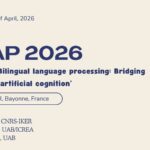27 maig, 2020
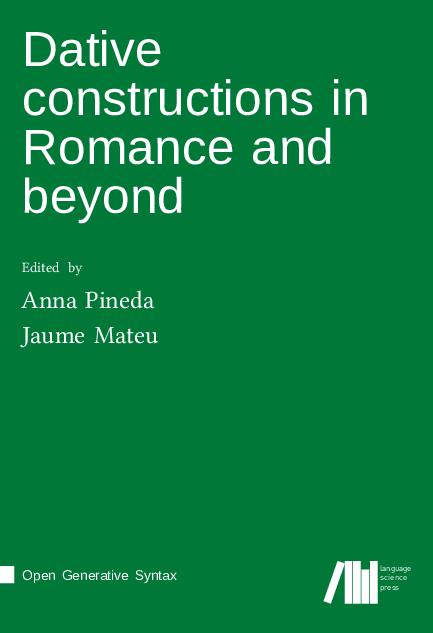
Autors:
Anna Pineda & Jaume Mateu (coeditors)
Títol:
Dative constructions in Romance and beyondEditorial: Language Science Press
Data de publicació: Maig de 2020
ISBN13: 978-3-96110-249-5
Més informació
Text completThis book offers a comprehensive account of dative structures across languages –with an important, though not exclusive, focus on the Romance family. As is well-known, datives play a central role in a variety of structures, ranging from ditransitive constructions to cliticization of indirect objects and differentially marked direct objects, and including also psychological predicates, possessor or causative constructions, among many others. As interest in all these topics has increased significantly over the past three decades, this volume provides an overdue update on the state of the art. Accordingly, the chapters in this volume account for both widely discussed patterns of dative constructions as well as those that are relatively unknown.
15 juny, 2021
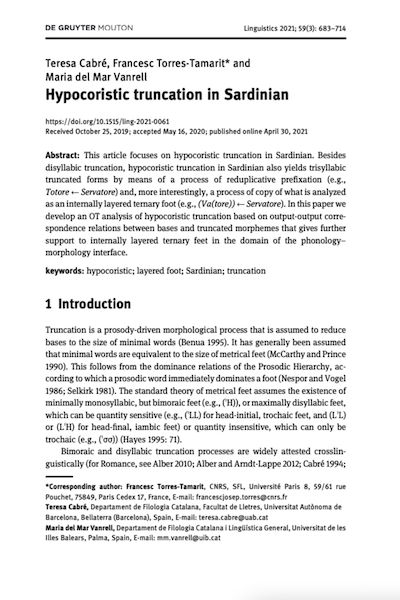
Autors:
Teresa Cabré, Francesc Torres-Tamarit i Maria del Mar Vanrell
Títol:
Hypocoristic truncation in Sardinian, Linguistics vol. 59(3)Editorial: De Gruyter
Data de publicació: 30 abril 2021
Més informacióThis article focuses on hypocoristic truncation in Sardinian. Besides disyllabic truncation, hypocoristic truncation in Sardinian also yields trisyllabic truncated forms by means of a process of reduplicative prefixation (e.g., Totore ← Servatore) and, more interestingly, a process of copy of what is analyzed as an internally layered ternary foot (e.g., (Va(tore)) ← Servatore). In this paper we develop an OT analysis of hypocoristic truncation based on output-output correspondence relations between bases and truncated morphemes that gives further support to internally layered ternary feet in the domain of the phonology–morphology interface.
18 gener, 2022
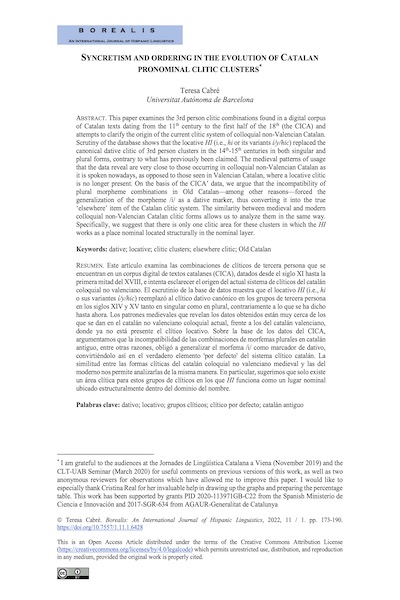
Autors:
Teresa Cabré
Títol:
Syncretism and ordering in the evolution of Catalan pronominal clitic clustersEditorial: Borealis: An International Journal of Hispanic Linguistics, 11(1), pp. 173-190
Data de publicació: Maig de 2022
Més informacióThis paper examines the 3rd person clitic combinations found in a digital corpus of Catalan texts dating from the 11th century to the first half of the 18th (the CICA) and attempts to clarify the origin of the current clitic system of colloquial non-Valencian Catalan. Scrutiny of the database shows that the locative HI (i.e., hi or its variants í/y/hic) replaced the canonical dative clitic of 3rd person clusters in the 14th-15th centuries in both singular and plural forms, contrary to what has previously been claimed. The medieval patterns of usage that the data reveal are very close to those occurring in colloquial non-Valencian Catalan as it is spoken nowadays, as opposed to those seen in Valencian Catalan, where a locative clitic is no longer present. On the basis of the CICA’ data, we argue that the incompatibility of plural morpheme combinations in Old Catalan—among other reasons—forced the generalization of the morpheme /i/ as a dative marker, thus converting it into the true ‘elsewhere’ item of the Catalan clitic system. The similarity between medieval and modern colloquial non-Valencian Catalan clitic forms allows us to analyze them in the same way. Specifically, we suggest that there is only one clitic area for these clusters in which the HI works as a place nominal located structurally in the nominal layer.
20 juny, 2019
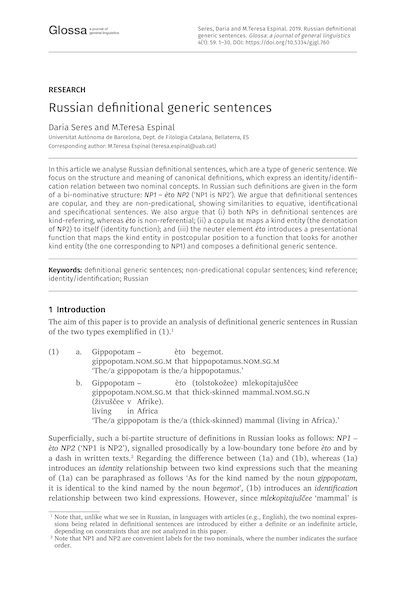
Autors:
Dària Serés, M.Teresa Espinal
Títol:
Russian definitional generic sentencesEditorial: Glossa: A Journal of General Linguistics, 4(1). Ubiquity Press
Data de publicació: 14 de juny de 2019
Pàgines: 30 Més informació
Text completIn this article we analyse Russian definitional sentences, which are a type of generic sentence. We focus on the structure and meaning of canonical definitions, which express an identity/identification relation between two nominal concepts. In Russian such definitions are given in the form of a bi-nominative structure: NP1 – èto NP2 (‘NP1 is NP2’). We argue that definitional sentences are copular, and they are non-predicational, showing similarities to equative, identificational and specificational sentences. We also argue that (i) both NPs in definitional sentences are kind-referring, whereas èto is non-referential; (ii) a copula be maps a kind entity (the denotation of NP2) to itself (identity function); and (iii) the neuter element èto introduces a presentational function that maps the kind entity in postcopular position to a function that looks for another kind entity (the one corresponding to NP1) and composes a definitional generic sentence.
28 octubre, 2020

Autors:
Olga Borik, Joan Borràs-Comes & Dària Serés
Títol:
Preverbal (in)definites in Russian: An experimental study, chapter 3 in K. Balogh, A. Latrouite & R. D. Van Valin, Jr (eds.) Nominal anchoringEditorial: Language Science Press
Data de publicació: 2020
Més informació
Text completThis paper presents an experimental investigation aimed at determining the exact nature of the relationship between type of interpretation (definite or indefinite) and linear position (pre- or postverbal) of bare nominal subjects of intransitive predi- cates in Russian. The results of our experiment confirm that preverbal position correlates with a definite interpretation, and postverbal position with an indefinite interpretation. However, we also discovered that the acceptance rate of preverbal indefinites is reasonably high. We suggest an explanation for the appearance of indefinites in preverbal subject position in terms of lexical accessibility, which is couched in general terms of D-linking.










